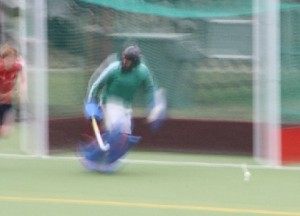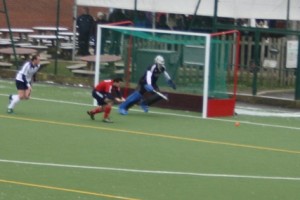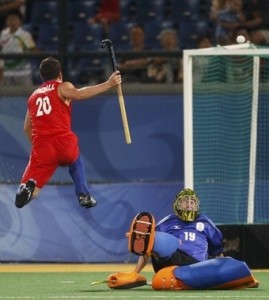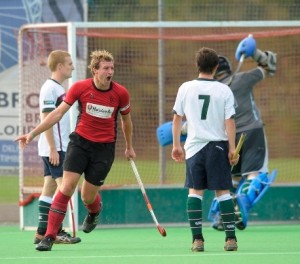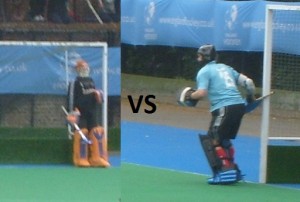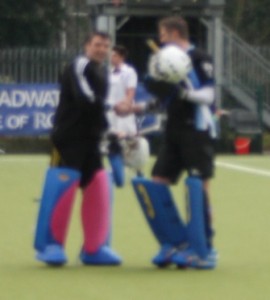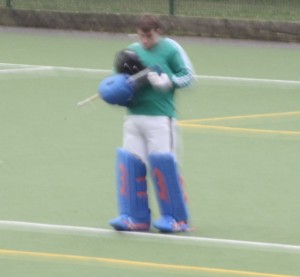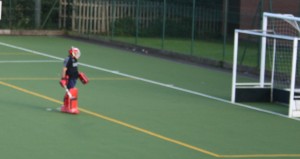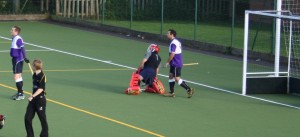Not the video game I used to enjoy playing as a youngster, but making use of a title with the phrase with an allusion to the same premise, when it comes to getting involved with the game and being able to instantly sprint out when called upon, rather than looking like you’re not interested in winning! Arguably, whilst a goalkeeper may not be ‘on the move’ all the time as their team mates go up and down the pitch, the goalkeeper needs to able to react explosively and be able to run as quickly as possible within their kit to charge down an attacker or rebound opportunity say. And when it comes to your role and play within the overall game as a goalkeeper, you have to be ‘quick off the mark’ and a ‘speed demon’ (well, maybe not, that’s more like ‘Need for Speed’ but the metaphor’s there!) in relation to sprinting out for loose balls or interceptions; same for foot work and getting across goal.
Tom Millington of Wimbledon rushes out to beat an attacker to get to the loose ball.
Excuse the blurry photo: goalies moving at the speed of light (shutter speeds wrong!)!
Quicksilver
You might know ‘Quicksilver’ from the surf/skate/snow brand if you’re into ‘alternative’ sports, or as its synonym for mercury, but I think the terminology can be applied when reflecting on how we play as goalkeepers. Maybe it’s a poor definition as it is referred to as something that changes quickly and is difficult to contain. Goalkeepers are difficult to contain (like ‘Animal’ maybe!) but I’m not sure we’re shape shifters! Without rambling as my brain does work, I still think it is a useful way into contemplating and thinking the way a goalkeeper needs to be quick on their feet and able to quickly respond to passes into the D from aerials or breakaways and so on. A goalkeeper has to be able to rush out, whether it be off their line to slide tackle, or to get to a loose ball to ‘kick out of the park’ and get rid of that great scoring opportunity (i.e. if a player is coming in to close and latch onto it!). Fitness wise goalkeepers are expected to put up good times on beep tests and the like at the elite levels, just like the other players (don’t see why goalkeepers shouldn’t push themselves to show that goalies rule!), but sprinting is a little different; different technique and different impact on the body.. Long distance running or stamina based (need to check the sports science, my understanding isn’t so great, didn’t study it!) running is not the same as explosive sprints.
I am naturally fast (theoretically, I’m no Usain Bolt!), maybe, so perhaps this natural aspect can have an effect on us goalkeepers in the way things happen as we use our natural speed to impact the game? But that’s not to see it’s not impossible to improve or push yourself to play intensely and sprint out when required! You can work on technique and your attitude to sprinting with explosiveness itself. I was still involved with sprint teams as a youngster and ranked high when competing in school competitions for the 100 meters. So I guess this is pretty useful for a goalkeeper who needs to react instantaneously and as fast as possible when game changes occur which you need to shut down. In my opinion, the quicker you naturally are, the better you are to get there quicker than the next guy (or goalkeeper if you’re competing for a spot!). But this doesn’t mean you can’t work on sprint technique or being explosive. You can practise speed time and work on your ability to run in kit, which is no easy task!
Goalkeepers need to be able to speedily rush out to have an effect on the game when things occur that the goalkeeper in question needs to respond to. If they don’t, they can concede by not getting to a breakaway with the required speed, or not getting to a rebound or secondary or consecutive scoring chance quickly enough say! Goalkeepers need to be like a coiled spring, ready to spring out with momentum. Explosive and agile, whether that be in shot stopping and instantaneous recoveries to get back into the play and behind a consecutive scoring chance, or when rushing across to make a save on the other side of goal, goalkeepers should look like they want to make the save or play, versus not responding intensely and therefore not looking like they want to win! You could say some may be attracted to the position (at first sight and then grow into the position!) because they think it will mean they won’t have to run around as much, but that’s definitely not the case! Whereas we all know that your kit needs to be like a second skin and you have to be as fast as physically possible. You need the agility of a fast track sprinter if you want to be able to chase down loose balls and make timely interceptions and these needs, need to be incorporated into our game as goalkeepers!
Times when you need to be able to ‘get out the blocks as soon as possible include situations as follows:
- Sprinting out off the line to challenge
- Rushing out to cut off a breakaway
- Racing to get to a loose ball or behind it to cover
- Getting across to the other side of goal to block or cover
- Running out to make a decisive interception
The following video illustrates this ‘need for speed’, with the university men’s goalkeeper (wearing the helmet/cage combo) rushing out off his line to challenge an attack, as well as sprinting across to deal with a second chance opportunity:
Explosive!
Whereas outfielders are constantly back and forth across the pitch, a goalkeeper has a more contained approach to running around. Potentially! Yes, they do move around a lot in their stance and have footwork to see them readjust to each post or angle as the ball is moved around the pitch, but when running out to meet opportunities, things are a little different. They are more explosive in small amounts i.e. there should be few times when you really need to rush out to attack an opportunity. Unless there’s something going wrong, you’re not facing lots of breakaways, constantly running out to challenge, during a game, one after another! If a goalkeeper is playing behind a strong defensive unit during the game, then they aren’t going to have come off their ‘line’ to challenge all that often. BUT when it happens they’re going to have to and have to quickly! So aside from moving around laterally around the D, explosive sprinting is where you’re going to have to move instantly with speed.
Quick recoveries
Whilst they may not be considered specifically related to moving quickly in kit to attack scoring chances, quick recoveries are still an important aspect of playing actively. You have to react just as quickly and intensely as you need to be when sprinting out. And anyway, the two connect together, especially when getting back onto your feet as quickly as possible in order to rush across to the other side of goal, say! With great speed and intensity in order to make the save. Don’t wait, don’t expect to be able to just make the save where you are; get back on your feet as quickly as you can and get involved in the action rather than ‘sitting out’ the play as a backseat driver or observer!
Breakaways
When faced with a breakaway opportunity for the opposition, as they get through the defence, the goalkeeper needs to be quick off their line to come out and stop it in its tracks. Obviously, you are going to have move with speed. Although, obviously timing comes into this as you don’t want to get there too early and not be able to tackle, but time it precisely so that you make the intercept bang on time (and get there exactly when you mean to, like Gandalf!). Either way, you still need to move quickly in your kit to get there in time.
Chasing down loose balls
This is a very important aspect of being able to move around your D and pitch (although we can only go as far as the 25, need to get in umpiring to work on remembering things!). If we are faced with a free-for-all free ball that has come loose, we need to get there before an opposition player does, as they could obviously score from it. A powerful rebound may be redirected on the save and latched onto by a player, even if we do make a controlled save with the rebound (power of shots at elite levels make this possible), and if so, the goalkeeper needs to do something to try and disrupt a second chance.
Similarly, any loose ball that has come from the result of a pass or similar needs to be dealt with. You need to rush out to close the ball done, or better yet, kick it with power clear and at distance away from another chance on goal. You may be safe enough to watch it off the pitch, but you still need to get across to cover just in case! This ability to read the game and clear, or watch it off, is decisive; you need to be able to stop another attack from occurring. And a loose ball is anyone’s so you need to claim it and stop the team scoring most importantly!
Bromley’s goalkeeper sprints to cover a loose ball, which thankfully goes over the line (after the photo was taken!).
And most importantly you really need to be fast enough to beat the attacker to the ball! Which means you’ve got to be faster than a quick attacker, whilst sprinting in kit! This also comes down to ‘attacking clearances’ when rushing out to kick and then drive through.
Interceptions
Again, like a breakaway is a form of interception, intercepting passes to stop a goal being scored off the pass and redirect or space opened up by exposing your far side, you need to be quick on your feet to get there and meet the ball as it’s passed across. You’re not going to be able to get on the end of the ball or reach it to intercept the pass and block it from reaching its intended recipient, unless it’s near to you! So, again, speed and awareness is needed.
Lateral plays
Some goalkeepers prefer to react to the pass as it is played across. Either to get across to stop or to move with and attack the pass. Instead of just looking to cut off the ball carrier or challenge them. In this case, either way, you are still moving across with speed and strong footwork as you move across in your stance in order to get across to attempt the save. Less sprinting and more quicksilver shuffling!
Post to post
Moving post to post other than for coverage as the play moves, you may also find yourself out of position thanks to having to go out and meet an attacker, only for the play to change! You may leave your post to challenge, sliding off to deal with a baseline attack. You may stop it; the ball gets loose, free to another opposition player and then have to go all the way across to the other side of goal to deal with this new, changed threat! If you don’t then you’re not going to have any chance of making the crucial save! This requires determination and all the attributes of agility and strong footwork to get across in time. You really need to be fast as quicksilver at a time like this!
The following clip shows an amazing save by Hampstead and Westminster and England A goalkeeper Ian Scanlon. He goes to challenge to his left as the ball carrier comes in, only for the ball holder to release the ball and pass to another attacker who has arrived, running into the D. Out of position, he has to readjust and rush across to the other side of goal to deal with the consequential shot. This is the exactly the kind of save discussed in the ‘Never say never’ article about never giving up on the play. He doesn’t give up on the play or get negative; instead, he rushes across, has great foot speed and then dives to make a save that keeps the score level. Amazing save! Without that his team aren’t in it! It shows solid fundamentals of foot work, agility, drive and passion when it comes to the save, something to learn from! Save is at about 0:25 playing time.
Working on your speed
Like I reckon, speed is something natural but that doesn’t mean you can’t improve your running. You can use leg weights and resistance training theoretically (I’m sure a sports scientist can correct me and explain it better!) to build up the speed you run at and explosively push through when sprinting. Along with footwork drills for quicker footwork! Working on basic sprint technique is going to improve sprinting speeds anyway as you’ll move faster than you did before! There’s a chance to improve even if you are not naturally the fastest around. But working on short controlled bursts of sprinting routinely over time should help you get quicker bit by bit. You can work on sprinting out of kit and then bring this into training sessions if you have time spare or before shots to get some practise in.
Like this sort of thing, sort of (should be easy to search for other examples and drills!)!
Have quick feet!
Ultimately, as a goalkeeper you need to be able to respond to the game as a defensive breakdown occurs, but you also need to be able to get involved in the play, by rushing out with your quick speed to close down attackers or loose balls and so on, as mentioned. You need to be quick and instantaneous, as fast as possible to get there as quickly as you can otherwise you’re already consigned to defeat! This is the same for recoveries to get back into the play and with saves, playing with intensity and athleticism, as written about before. Without this desire to win and stop goals by stopping opportunities with speed to close them down, you cannot really expect to win or dominant games as a goalkeeper. You need to play with an unbridled intensity that reflects your desire to win and be prepared to sprint out to stop shots occurring versus shot stopping! Food for thought! And whilst this write-up follows the more obvious implications of sprinting out, quick shuffles in your stance are just as important!!
